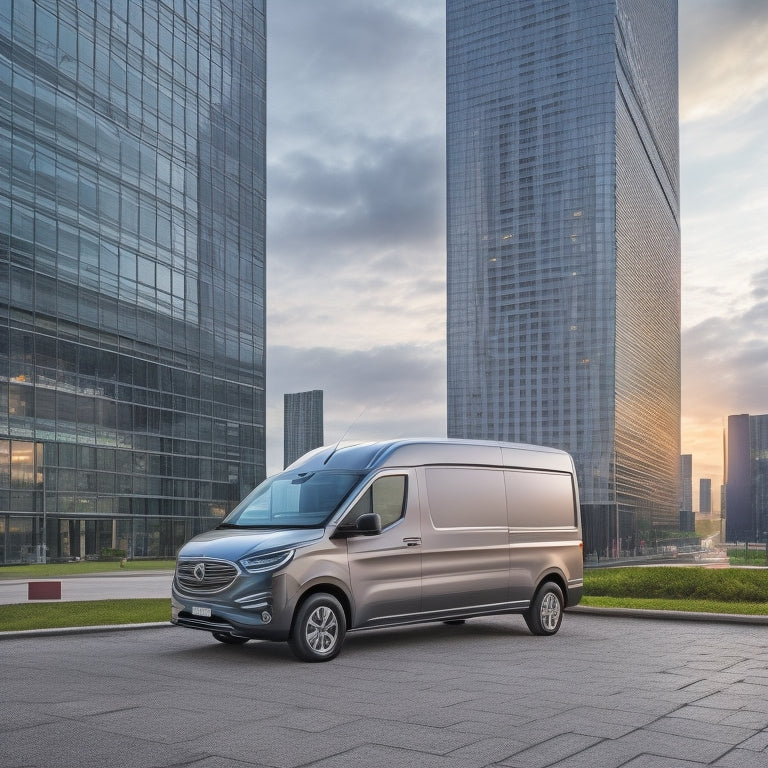
Are Electric Vans Your Business's Next Move
Share
As businesses explore alternative transportation options, electric vans are increasingly becoming a viable choice. With over 20 fully electric van models available and a remarkable 140% sales growth in 2021, it's clear that electric vans are gaining traction. Competitive pricing strategies are driving innovation, and government-backed incentives and grants are making the shift more accessible. When choosing the right electric van for your business, consider factors like budget, payload capacity, and charging infrastructure. With the right information, electric vans could be the perfect solution for your business's next move - and there's more to discover about making the shift a success.
Key Takeaways
• Electric vans offer a cost-effective solution with competitive pricing strategies driving innovation and affordable options.
• Government-backed incentives and grants can cover up to 35% of the purchase price, making them an attractive option for businesses.
• Consider factors like budget, payload capacity, charging requirements, and range anxiety when choosing the right electric van for your business.
• Medium-sized vans like Vauxhall Vivaro-e offer a tonne payload capacity, DC charging, and up to 300 miles on a single charge, making them a popular choice.
• Electric vans can seamlessly integrate into your fleet, providing a sustainable and efficient solution for your business's transportation needs.
Electric Van Market Overview
The electric van market is rapidly evolving, with over 20 fully electric van models available by the end of 2021, comprising more than 70 variants, and witnessing a remarkable 140% sales growth by the close of the same year.
This surge in demand can be attributed to the increasing adoption of electric vans by corporate customers, who are drawn to the environmental benefits and cost savings they offer. Maxus, a Chinese electric van maker, has gained significant popularity among both corporate and small business owners, thanks to its competitive pricing and reliable products.
As the market continues to grow, it's essential for businesses to stay informed about the latest developments and options available to make informed decisions about their fleet needs.
Pricing and Innovation
Competitive pricing strategies, particularly those employed by newcomers like Maxus, have pressured established van manufacturers to innovate and reassess their pricing models in the electric van market. This shift has led to a surge in affordable options, making electric vans a more viable choice for businesses.
Technological advancements have also played a pivotal role, enabling manufacturers to develop more efficient and cost-effective electric vans. As a result, established brands like Renault and Nissan are under pressure to innovate and adapt to the changing market landscape.
The influx of new players and innovative technologies has created a competitive environment, driving down prices and increasing the appeal of electric vans to businesses.
Incentives and Grants Available
Government-backed incentives, such as grants, have become an essential factor for businesses looking to integrate electric vans into their fleets. These incentives can greatly offset the higher upfront cost of electric vans, making them a more viable option for businesses.
To take advantage of these incentives, businesses must make sure they meet the grant eligibility criteria. Here are some key points to take into account:
-
Grant eligibility: Confirm that the electric van model meets the government's eligibility criteria, including a maximum RRP of £32,000.
-
Incentive impact: The grant can cover up to 35% of the purchase price, with a maximum grant of £2,500 for small vans and £5,000 for large vans.
-
Automated deduction: The grant is automatically subtracted by the retailer, making the process seamless.
- Eligible low-emission vehicles: Only models listed on the government's eligible low-emission vehicles list qualify for the grant.
Choosing the Right Van
Six key factors must be considered when selecting the ideal electric van for your business:
- Budget
- Payload capacity
- Charging requirements
- Range anxiety
- Maintenance needs
- Fleet integration
When choosing the right van, size considerations are important. Small, medium, and large electric vans cater to different business needs and budgets. Medium-sized vans, such as the Vauxhall Vivaro-e, offer a payload capacity of around a tonne and DC charging capabilities. Battery range is also a significant consideration, with some models offering up to 300 miles on a single charge.
Additionally, payload capacity and charging infrastructure must be assessed to guarantee seamless fleet integration. By evaluating these factors, businesses can select an electric van that meets their unique requirements, ensuring a smooth shift to sustainable operations.
Frequently Asked Questions
Can Electric Vans Be Used for Long-Distance Hauls and Deliveries?
Electric vans can be suitable for long-distance hauls and deliveries with careful route optimization, ensuring efficient battery life management, and strategic charging stops to minimize downtime and maximize operational efficiency.
How Do I Charge My Electric Van When I'm on the Road?
When on the road, utilize roadside charging stations or public networks like Ecotricity's Electric Highway, which offers fast charging at highway hubs, and plan routes accordingly to guarantee seamless charging and minimize downtime.
Are Electric Vans Suitable for Businesses With Multi-Drop Deliveries?
Like a well-oiled machine, electric vans can seamlessly navigate multi-drop deliveries with route optimization and delivery scheduling, ensuring a smooth and efficient operation that keeps businesses humming along.
Can I Install Charging Points at My Business Premises?
Installing charging points at your business premises can provide convenient Employee Parking and significant Cost Savings, streamlining operations while reducing your carbon footprint, making it a valuable investment for environmentally conscious businesses.
Do Electric Vans Require Special Maintenance or Servicing?
Just as a musician must tune their instrument to produce harmonious sounds, electric vans require specialized maintenance to optimize performance. Regular battery health checks and the elimination of oil checks simplify servicing, ensuring a seamless operational rhythm.
Related Posts
-

3 Best Eco-Grants for Home Energy Upgrades
You're eligible for various eco-grants that can help you cut down on energy bills and reduce your carbon footprint by...
-

What Do Power Strips Do for Standby Energy?
You're likely aware that your devices, such as TVs and computers, continue to draw power even when turned off, a phen...
-

7 Best Home Hydrogen Fuel Cells for Clean Power
You're considering adopting hydrogen fuel cells for clean power at home, but you want to know the best options. Reput...


